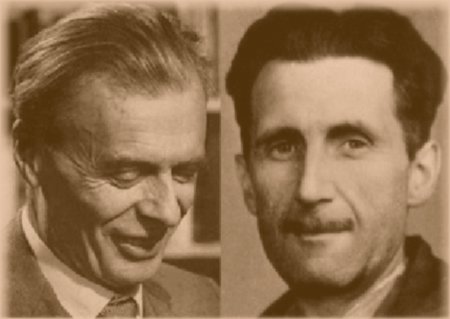Orwell v. Huxley
George Orwell wrote Nineteen Eighty-Four. Aldous Huxley wrote Brave New World
. Both were dire, dystopian works that speculated upon a horrid future. The two great authors were, however, wildly divergent in their fears and warnings.

George Orwell v. Aldous Huxley – Divergent Distopian Predictions
Both Orwell and Huxley feared a future when we would be a captive culture. Orwell feared captivity by the State but Huxley feared captivity by own venality and pleasure seeking.
Orwell depicted a future society where books were banned and where the State would deprive us of information. Huxley posited a future society where would be no reason to ban a book, because there would be no one who would want to read one, but where so much data would be provided that we would be sunk into egoistic pacifism.
Orwell feared that the State would conceal the truth from us. Huxley feared the truth would be drowned out by the constant nattering stream of irrelevancies.
Simply put, Orwell feared hate and pain whereas Huxley feared love and pleasure. There is grim sense in both men’s fears; both the “carrot” and the “stick” are used to gain and maintain control.
The Future Is Now
The Civilized World in general and America very much in specific it poised at a watershed moment or tipping point where either Orwell’s or Huxley’s dire predictions could come true. The future in all its dystopian horror is now or, at least, looming on the horizon before us. This is something that the awake and aware among us know full well, though they, like Orwell and Huxley, are divided in their worries.
Conservatives, especially those referred to as the Religious Right or Social Conservatives are in Aldous Huxley’s camp. They fear that venality, lusts, and the pursuit of unrestrained transitory pleasures will create a society lost to itself and sunk in depravity.
Liberals, on the other hand, are in George Orwell’s camp. They fear that the State, under one pretext or another, will become forcibly despotic. They fear that hatred and fear will create a totalitarian regime ruling over a captive populace.
As for myself, I think that Huxley’s fears are the more likely to be realized in the near-term. I think it far more likely that the populace will blithely cede its liberty to some oligarchy in the course of its own decline into self-serving venality. Of course that doesn’t mean that, once in power, that oligarchy won’t begin to shift to a more Orwellian model.
Which, if either, do you think is more likely?
Tags: Books & Reading | Conservatives | Ethics & Morality | Huxley | Liberals | Orwell | Pain | Philosophy | Pleasure | Politics | Society | Tyranny


October 8th, 2010 at 4:22 pm
Orwell, Huxley, and John Spartan…
Jonolan at Reflection from a Murky Pond presents an interesting question regarding the trend of leftist totalitarianism. Is our future one imagined by Orwell’s 1984, in which a brutal, repressive government relied upon fear and force to control i…
March 10th, 2015 at 12:17 pm
The word “depravity” itself is laughable. People held refrains over sex because contraceptives were not available at that time, thus all the complicated social institutions such as marriage and family. At the time of Huxley condoms were not even in mass production. The advancement of technology has brought, and will keep bringing, liberation to individuals, instead of a totalitarian future. Brave New World was really way off in a lot of aspects, mixed things together, and is not a very respectable book TBH.
March 10th, 2015 at 1:03 pm
Frankly, I think you’re delusional, J. Technology has little to do with the creation of a totalitarian future and what it does have to do it is an enabling factor.
March 10th, 2015 at 1:09 pm
They say there is a mindless “consumerism” nowadays. That’s partly true. But just reflect upon the time of Huxley! Weren’t the vast majority of people living an even more controlled, uninformed, and mindless modes of life? Also, what the author intended to describe as “depravity” in the book are *exactly* the right, natural, and liberating things to do now (Even the word “depravity” itself, which is just a social construct specific to certain eras, in the same vein as “marriage” or “family”, reeks of archaic hypocrisy and restraints on human nature). Such appalling conservatism against the liberation and empowerment of individuals, such stubborn aversion and even denial to the power of rationality over primitive emotions, are doomed and to be ridiculed.
March 10th, 2015 at 1:19 pm
OK. Now I understand your position. You’re totally immoral in an interpersonal and sexual sense and want to spread that ideology. Got it. Bye now.